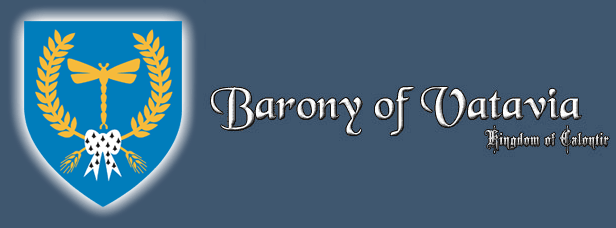
Medieval Vocabulary II
by Friar Thomas Bacon (David Moreno)
Orignally published in the February 2001, A.S. XXXV issue of the Dragonflyre, a publication of the Barony of Vatavia.
In response to a favorable reaction from last here is another list of words in use during the period, but have since fallen out of use. The criteria I used were words that could be used in ordinary conversation and are not technical jargon, or otherwise had already found their way into Societal use. Also included are words that have a different meaning today then they had then. The dates are of the first citation in the Oxford English Dictionary.
Abroad (1377): Outside. This took on the original meaning of about when that word took on its current meaning in the 13th century. A slightly older meaning was ‘widely or greatly scattered’. It took on its more familiar meaning of ‘going to foreign lands’ in the mid-15th century.
Address (1375): Straighten. This comes from the Latin word ‘directum’ which means ‘straight or direct’ with the addition of the prefix ‘ad’ to make it a verb. A century later it was also used to mean ‘to directly talk to someone’. Its sense of ‘a place of residence’ is 18th century.
Assize (1099): To sit. From the Latin ‘assidere’ meaning ‘sit beside someone’, it evolve to the more restricted meaning of ‘sit in judgment’ or ‘a session of a court’. It was also used to refer to the judgment itself a sort of synonym of ‘law’. Most often when setting prices or standards.
Beet or Bete (885): To kindle or make a fire. Also used in the sense of feeding a fire. Another definition was ‘to make good or amend’. In the 14th century this expanded to mean ‘relieve want’.
Cokes (1567): Simpleton. It was also used as a verb to mean ‘easily duped’.
Crowd (1310): Fiddle. This is different then the word to denote a large group of people. This word is of Celtic origin while the other is Germanic. In the late 16th century it was also used to denote playing the instrument or to sing.
Doom (825): Decree or judgment. This renders the true meaning of the title “Domesday Book”. Its current meaning of ‘fate’ arose in the 14th century from doomsday, or judgment day.
Inoculate (1420): To graft. By metaphoric extension, the Latin word for eye ‘oculus’ was used for a plant bud. Therefore the word inoculate was coined to describe the grafting of such buds, and by later extension other parts, onto plants. The word acquired its modern meaning in 1722.
Inveigh (1486): Carry in or introduce. The original sense is akin what we now mean by ‘blend or bleed in’. By the early 16th century in acquired its more aggressive connotation.
Lest, List, Lust (971): To please. These are the present, preterit and past participle conjugations of this verb. By the Middle English period they had been transformed to mean ‘desire’ or ‘pleasure’. By the time of Shakespeare, they had contracted to it current connotation. Note that there are many other words with these spellings but have no etymological connection.
Meager (13..): Thin. The sense of ‘scanty’ did not arise till around 1501.
Meden (1175): To reward. The reward itself was known as a ‘meed’ which is the older word.
Neap or Neep (725): Turnip. This is the original name for this vegetable. How the prefix ‘tur’ was added around 1533 is unknown.
Neat (825): Cow or Ox. The ancient word which gave rise to this word meant ‘use’. The implication is that these are useful animals. The other meaning of this arose in the mid-16th century from French.
Pain (1297): Punishment. This is its original meaning. And since punishment meant suffering it was metaphorical used to denote that as well.
Reprieve (1494): To take back. Usually to the prison. Which is a good thing considering you were going to your execution.
Roose or Rouse (1300): To praise or boast. The connotations of this word were usually negative as the speaker is often portrayed as a braggart or a sycophant.
Shaw (755): A small wood. This comes the Anglo-Saxon word ‘scuwa’ which meant ‘shady place’. It also shows up as part of family names.
Sleuth (1200): Track or trail. In the late 14th century, Scottish bloodhounds were known as sleuthhounds. Its use as a synonym for detective did not occur until the 1876 in America. While this came from Old Norse, in Old English, this word meant ‘sloth’ or ‘laziness’.
Slogan (1513): A Scottish war-cry. Comes from the Gaelic for ‘host-shout’. These were usually a surname or gathering place. Its expansion to mean any catch word or phrase occurred around 1704.
Stationer (1262): Bookseller. The origins of this word were original applied to stationary as oppose to itinerary sellers. The most common of these initially were the booksellers around the universities. The expansion to mean the ‘seller of any paper product’ occurred in the mid-17th century.
Stew (1400): To take a steam bath. This was also the name of the room where this activity took place. Later this also became a synonym for brothel as the public baths were a coming meeting place for prostitutes and their customers.
Twire (1600): To peep out. The first quoted citation of this word is in Shakespeare’s sonnet 28.
Warp (888): To Throw. The past tense of ‘werp’. The sense of bending or twisting was added around 1440. Symmetrically the word ‘throw’ also has a now obscure meaning of ‘twist’.
Bibliography
Ayto, John. Dictionary of Word Origins. New York: Arcade Publishing, 1990.
Mackay, LL.D., Charles. Lost Beauties of the English Language. London: Bibliophile Books, 1987.
Morris, William, ed. The American Heritage Dictionary of the English Language. New York: Houghton Mifflin Co., 1973.
Murray, James et. al., ed. The Oxford English Dictionary. Oxford: Clarendon Press, 1978.
Copyright © 1997 - present His Lordship Friar Thomas Bacon (David Moreno). All rights reserved.